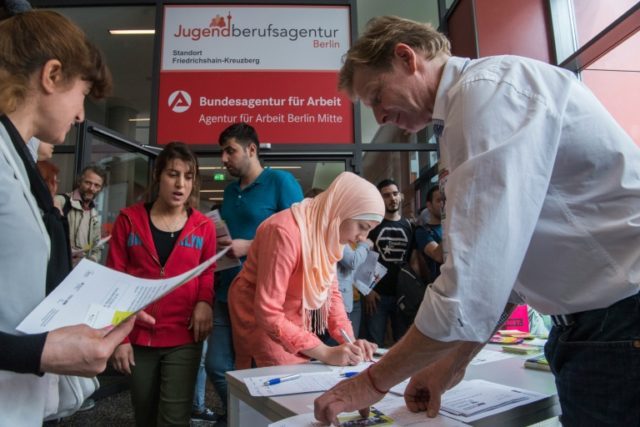Frankfurt (AFP) – The German economy will grow faster than expected in 2016 before slowing in 2017 and 2018, Berlin said on Friday, as pressure mounts for Europe’s top economy to invest more.
Germany’s gross domestic product (GDP) will increase by 1.8 percent in 2016 before slowing to 1.4 percent growth in 2017 and 1.6 percent in 2018, Economy Minister Sigmar Gabriel said.
Low oil prices and increased government spending to deal with Germany’s refugee crisis had driven growth in 2016, he added.
“The recovery in the German economy is solid,” Gabriel said, although “the global economy is not running smoothly” and “uncertainty has increased” in the wake of Britain’s June vote to quit the EU.
Friday’s latest projections boost April’s forecast for 2016 by 0.1 percentage points but cut expected growth by 0.1 percentage points for next year.
Gabriel, a left-winger, appeared receptive in his remarks to calls from prominent figures such as Christine Lagarde, head of the International Monetary Fund (IMF), for countries like Germany with cash on hand to invest more and drive global growth.
“Our economic strength helps us to overcome the great challenges before us,” he said, “whether that’s giving Europe new growth prospects or managing the effects of Brexit”.
– ‘Use your fiscal space’ –
Chancellor Angela Merkel’s conservative-led coalition government has been criticised abroad for its determination to achieve a balanced budget, a goal fiercely defended by her hardline Finance Minister Wolfgang Schaeuble.
“We need a real growth policy,” French Prime Minister Manuel Valls said on Friday. “I know this is a big point of contention with our great German partner.”
“Some countries have fiscal space. Well, if so, they should use it,” Lagarde said at the IMF’s annual meeting on Thursday.
Tax receipts have been on a sharp upwards trend as the German economy as it outperforms its European neighbours thanks to its powerful export engine, generating a huge trade surplus.
But Schaeuble has so far preferred to pay down Germany’s debts rather than borrow at the present ultra-low interest rates to finance fresh government spending.
European Central Bank president Mario Draghi last week said that “carefully targeted” spending increases might be appropriate for Europe’s economic powerhouse.
Draghi has long insisted that the ECB’s loose monetary policy of low interest rates, massive purchases of government and corporate bonds, and cheap loans for banks will only be fully effective at restoring growth if eurozone governments also do their bit by investing more.
His pleas have met with limited sympathy in the Berlin chancellery.
Merkel told business leaders on Thursday that her government’s no-new-debts policy was “not simply a fetish”.
“We can’t take on more debt at the cost of the next generation,” she said, in a nod to Germany’s ageing population.
But the chancellor acknowledged there might be room for tax cuts and investment in transport and digital infrastructure.

COMMENTS
Please let us know if you're having issues with commenting.